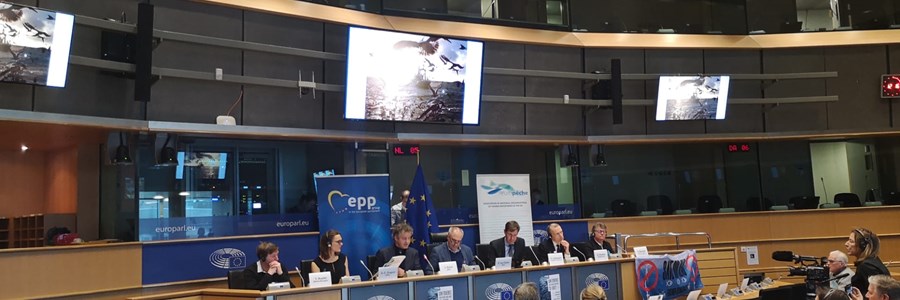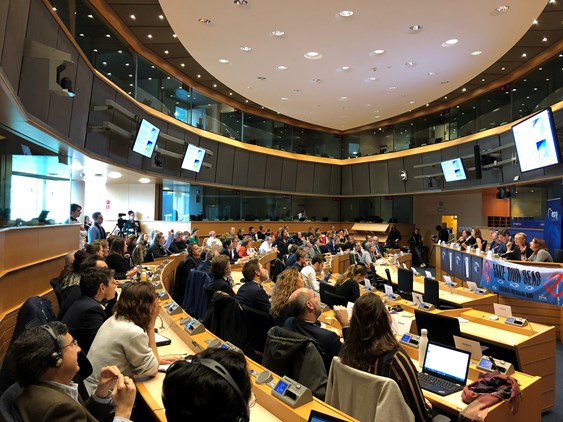Can Fisheries and offshore Wind Farms Coexist?

On 22 January 2020, the seminar ‘Can Fisheries and Offshore Wind Farms Coexist?’ took place in the European Parliament hosted by MEP Peter van Dalen (NL-EPP group), vice-president of the Fisheries Committee [1]. The event brought together a large spectrum of stakeholders, including scientists, wind industry representatives, NGOs, legislators, and small-scale fishers from Belgium, France, Germany, the Netherlands and Portugal that are impacted by or exposed to existing or planned offshore wind farms. These EU fishers, representing small and medium family owned businesses, shared their experience and concerns on the increasing competition over the maritime space which is leading to the loss of valuable fishing grounds and access to healthy stocks.
The investment made in recent decades to make fishing operations socially, economically and ecologically sustainable is a success story lead by the European Union. EU fishermen alert that this investment and the long term efforts of the fisheries involved are now under a direct threat, and in some cases already damaged by the uncontrolled development of offshore wind capacity. Namely, sustainable fishing activities require space as does the development and operation of offshore wind farms.
The EU therefore adopted back in 2014 a Directive for maritime and coastal spatial planning urging Member States to ensure that human activities at sea take place in an efficient, safe and sustainable way and reduce users’ conflicts. Nonetheless, the climate mitigation targets are vast, with the EU’s Paris Agreement nationally determined contribution to reduce greenhouse gas emissions by at least 40% by 2030 compared to 1990. For this purpose, some countries are pushing to increase offshore wind power 40-fold by 2030 in Europe.
Therefore, the question 'Can fisheries and wind farms co-exist?’ is a relevant but complex question which will become more pressing in the near future. As expressed by the host, Mr Peter van Dalen, this event was the kick start of a longer discussion. To trigger scientific based discussion, Mr Peter van Dalen was also recently appointed as Rapporteur of the Initiative report on the impact on Fisheries of Offshore Wind Farms (2019/2158(INI)) which is being prepared in 2020. Europêche fully endorses this Parliamentary Report as it provides the opportunity to assess existing gaps in the knowledge on the impact of wind farms on fisheries and biodiversity. As also pointed out by the scientists during the seminar, more research needs to take place as there is uncertainty surrounding the possible negative consequences and on how long it will take the ecosystem to recover.

According to Mr Job Schot, a Dutch fisherman: “We cannot see the benefits of wind farms at sea as we already see indicators of fish decline in areas where wind parks are built. Besides, the parks are always built on rich fishing grounds. It is clear that both activities cannot co-exist in the same area, but as fishermen, we do want to continue our livelihoods and keep on fishing for generations to come.” Mr Olivier Becquet, a French fisherman added: “The current expansion of offshore wind parks should not continue before research has come up with answers to the many knowledge gaps. Offshore wind is not climate neutral and poses risks to many species. We need to set our priorities on living and eating, as energy is comfort.”
Following the aforementioned, EU fishermen call on the European Parliament to support their call for a freeze on the development of offshore wind farm capacity, and prevent its extension into new areas, particularly in sustainably managed fishing grounds.
[1] And co-organised by Europêche, VisNed, EMK and Collectif Pêcheurs Artisans.
ENDS
Press contacts:
Rosalie Tukker, Policy Advisor of Europêche: +32 2 230 48 48 rosalie.tukker@europeche.org
Sources: Europeche
Tags: european parliament, offshore wind, wind farms, EPP, Fisheries Committee, small-scale, MSP, Paris Agreement, biodiversity, ecosystem, fishing grounds, livelihoods, wind parks, Research, knowledge gaps